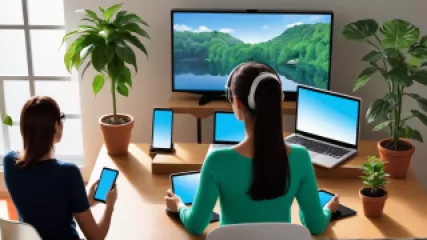How Can I Effectively Reduce Screen Time with Screen Time Tracking?
Living in the digital age means that we are constantly surrounded by screens. Whether it's our smartphones, tablets, laptops, or televisions, it's hard to escape the allure of technology. While technology has undoubtedly made our lives easier and more convenient in many ways, it's important to recognize the impact it can have on our well-being. Excessive screen time has been linked to a variety of health issues, including eye strain, poor sleep quality, decreased physical activity, and even mental health problems.
Recognizing the need to reduce screen time and prioritize offline activities is the first step towards establishing healthy tech habits. One effective method for achieving this is through screen time tracking. By monitoring and analyzing your screen time, you can gain valuable insights into your digital habits and make informed decisions about how to reduce your screen time.
The Benefits of Screen Time Tracking
Screen time tracking involves keeping a record of the amount of time you spend on various devices and apps throughout the day. This data can be eye-opening and provide you with a clear picture of just how much time you're devoting to screens. Here are some key benefits of screen time tracking:
- Awareness: Monitoring your screen time helps create awareness of how much time you're spending on screens. This knowledge can motivate you to make changes and find a healthier balance.
- Accountability: Tracking your screen time holds you accountable for the time you spend on devices. It's easy to lose track of time when you're engrossed in an activity, but having concrete data can help you stay mindful of your habits.
- Identifying Patterns: By analyzing your screen time data, you can identify patterns and triggers that contribute to excessive screen use. This insight allows you to develop strategies for managing those triggers and finding alternative activities.
- Setting Goals: Screen time tracking enables you to set realistic goals for reducing your screen time. By establishing specific targets, you can work towards gradually decreasing your usage and creating a healthier relationship with technology.
How to Effectively Reduce Screen Time with Screen Time Tracking
Now that we understand the benefits of screen time tracking, let's explore some practical strategies for effectively reducing screen time:
1. Set Clear Goals
Start by setting clear and realistic goals for reducing your screen time. Consider how much time you currently spend on screens and determine a target reduction. For example, if you currently spend four hours a day on your smartphone, aim to reduce it to two hours initially. Gradually decrease your goal over time until you reach a healthy balance.
2. Use Screen Time Tracking Apps
There are numerous screen time tracking apps available for smartphones and computers that can help you monitor your digital habits. These apps provide detailed reports on your screen time, app usage, and even offer features like setting screen time limits and blocking distracting apps during certain hours.
Screen Time: This app, available for iOS devices, allows you to track your screen time, set app limits for specific categories, and even schedule downtime where only essential apps are accessible.
RescueTime: Compatible with various platforms, RescueTime provides detailed insights into your digital habits and allows you to set goals for productivity and screen time.
Forest: Forest is a unique app that gamifies screen time reduction. It encourages you to stay off your phone by planting virtual trees that grow when you're not using your device. The longer you stay focused, the more your virtual forest flourishes.
3. Establish Tech-Free Zones
Designate certain areas of your home as tech-free zones, such as the dining table or the bedroom. This creates physical boundaries that help you disconnect from screens and prioritize offline activities. Establishing these boundaries can also improve sleep quality by keeping electronic devices out of the bedroom.
4. Practice Mindful Screen Use
Mindful screen use involves being intentional and present when using technology. Instead of mindlessly scrolling through social media or spending hours on video streaming platforms, set specific time limits for these activities and stick to them. Engage in activities that provide value and enrich your life, such as reading a book, going for a walk, or spending time with loved ones.
5. Find Alternative Activities
Reducing screen time is much easier when you have alternative activities to engage in. Discover hobbies or interests that you enjoy and that don't involve screens. This could be anything from painting to playing a musical instrument, gardening, or practicing yoga. Having a variety of offline activities to choose from will make it easier to resist the temptation of screens.
6. Involve Others
Reducing screen time can be a challenge, especially when everyone around you is heavily reliant on technology. Involve your family members or friends in your journey towards healthier tech habits. Set screen-free hours or plan activities that encourage face-to-face interaction, such as game nights or outdoor adventures.
Conclusion
In today's digital world, reducing screen time is crucial for our overall well-being. By incorporating screen time tracking into our lives and implementing strategies to prioritize offline time, we can develop healthier tech habits and find a better balance between the digital and physical worlds. Remember, it's not about completely eliminating screens from our lives, but rather establishing a healthy relationship with technology. Embrace the power of screen time tracking and take control of your digital habits.






